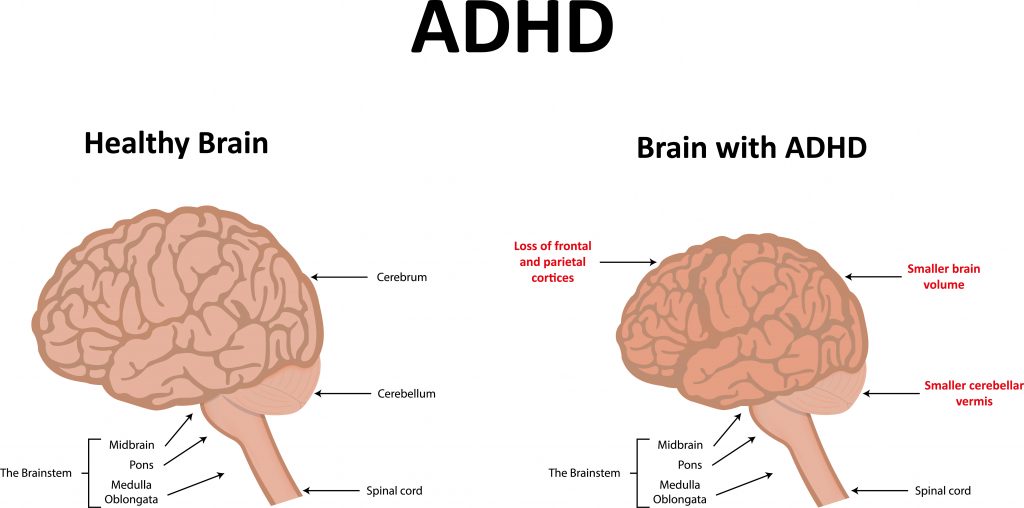People Who have ADHD Are All Around Us
Though commonly associated with children, 30% – 70% of adults experience a continuation of ADHD symptoms into adulthood. One of the main symptoms of ADHD in both children and adults is impulsive behavior. When considered alongside the co-morbid risk of anxiety and depression in people with an ADHD diagnosis, this symptom can also indicate an increased risk of developing alcohol and drug dependencies.This article will explore the surprising connections between ADHD and addiction.
If you have been diagnosed with ADAH, you’re not alone. Here are some famous people with ADHD: Justin Timberlake, Simone Biles, Paris Hilton, Adam Levine, Howie Mandel, Karina Smirnoff have all coped with an overcome their ADHD. Do you wonder why people with ADHD often develop addictions?
Connections Between ADHD and Addiction
Recent studies have revealed some eye-opening links between ADHD and drug addiction.
ADHD and Alcoholism
25% of adults treated for alcoholism have an ADHD diagnosis. The prevalence of ADHD in adults treated for alcoholism is much higher than the prevalence of ADHD in the general population, which sits at roughly 4.4%.
ADHD and Opioid Addiction
For adults receiving opioid addiction treatment, 33% have an ADHD diagnosis. Like with ADHD rates in people with alcoholism, people with ADHD are more likely to become addicted to opioids than the general population.
What is the Cause of Higher Addiction Rates in Adults with ADHD?
Both addiction and ADHD are illnesses that have genetic and environmental underlying causes.
Genetic Factors of Addiction and ADHD
ADHD is highly heritable—with a roughly 75% heritability. This means that if a parent has an ADHD diagnosis, there is a 75% chance their children will also have ADHD. We also know that there is a genetic component to addiction.
Environmental Factors of Addiction and ADHD
Environmental factors, such as socioeconomic status, exposure to harmful chemicals, or trauma, can increase the risk of developing both addiction and ADHD, especially if there is a predisposition.
Exploring the Psychological Processes of Addiction and ADHD Symptoms
One study outlined striking parallels between the three-step psychological process of addiction and three major symptoms of ADHD. These parallels help explain why ADHD is much more prevalent in people with addiction than in the general population.
Key biological processes of the addiction process are reinforced and exacerbated by certain ADHD symptoms:
Impulsivity and the Binge/Intoxication State
Impulsivity, defined medically as “action without foresight,” is a symptom of ADHD. In fact, the medical consensus is that ADHD symptoms make it difficult for people with the condition to self-regulate a whole bunch of mental processes.
Because ADHD impairs a person’s ability to control their behaviors and process the consequences of them, people with ADHD are more likely to get hooked on addictive substances.
Diminished Sensitivity to Reward and the Withdrawal/Negative Effect Stage
Another symptom of ADHD is impatience and a low tolerance for frustration, which the study frames as, “intolerance for boredom.” This proclivity toward impatience and intolerance for boredom is a result of the ADHD brain and its problems managing dopamine and serotonin levels.
People with ADHD become bored more easily due to this dysregulation in their limbic system (the reward system in the brain) and will seek out increasingly more extreme or risky stimuli to achieve the dopamine and serotonin levels they need to feel satisfied.
This dysregulation of the reward system in the brains of people with ADHD makes experiencing withdrawal symptoms more intense and unbearable. Coupled with other ADHD symptoms like impulsivity, a person with ADHD is more likely to seek more and more of the addictive substance, once they start to feel withdrawal symptoms.

Impaired Control and the Preoccupation/Anticipation Stage
Another symptom of ADHD is impaired executive functioning (EF). EF generally refers to the cognitive processes that deal with top-down control and organization of thoughts, behaviors, and emotions. EF impairment affects all areas of a person’s life, from getting to places on time to staying organized, or managing a series of tasks.
This makes it exceedingly difficult for people with EF impairments to adhere to routines and follow treatment plans that could help them enter recovery. This is because people with EF impairments are less likely to be able to plan beyond urges and therefore will be less likely to resist them.
People With ADHD Who Receive Treatment are Less Likely to Have an Addiction
Adults who seek treatment for ADHD symptoms are better able to control the ADHD symptoms which make it harder to manage urges and resist using. There is evidence that children who are treated for ADHD symptoms are less likely to become addicted to drugs as adults. On the flipside, untreated ADHD causes a whole range of behavioral and emotional disorders in adults which can make addiction worse.

Jenn Walker is a freelance writer, blogger, dog-enthusiast, and avid beachgoer living unapologetically in recovery. She writes for Maryville treatment center, a recovery center specializing in medication-assisted treatment in New Jersey.
More to read
How To Talk about Your Recovery
7 Best Tips For A Relapse Prevention Plan
8 Tips To Overcome Recovery Resistance
Setting Healthy Boundaries in Relationships





















